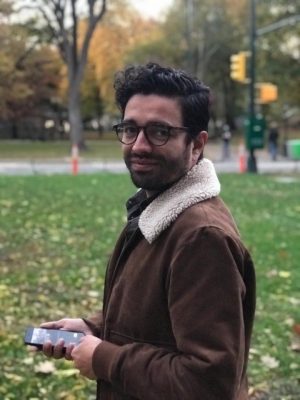A Day in the Life of a Humanitarian Policy student: Alejandro Bonil Vaca, MPA '20
Thanks for Alejandro Bonil Vaca for this guest post.

After eight days of self-isolation in my on-campus apartment in New York, I wake up to my first after-spring-break class…on Zoom. It’s a short course called Accountability in Humanitarian Emergencies. The instructor introduces herself and says she is joining from Geneva, where she works for a prominent Humanitarian Coordination UN Agency. She apologizes because this is the first time she is giving an online lecture.
After spending a couple of minutes solving “technical issues," the class starts with a very traditional icebreaker: students introduce themselves: "Hi, my name is Alejandro Bonil Vaca; I am a second-year MPA Student concentrating in HRHP and specializing in GPP and DAQA. I have about 9 years of professional experience in humanitarian and development work, particularly in needs assessments and program evaluation."
I was not fond of icebreakers, but during my time at SIPA, I came to like some of them (even though I struggled with some of the jargonish acronyms as a Colombian Spanish speaker!). You get to hear about the fantastic experiences and knowledge that your fellow SIPA students have.
When I was a prospective student, I knew that, Yes, SIPA faculty is excellent and internationally recognized. Yes, this is an Ivy League school. Yes, SIPA is very well ranked policy school. But, I had no idea I would be spending two years of my life surrounded by humans who are actually making a difference in their countries, people who inspire me, people committed to giving back to their communities, people with knowledge of how-the-world-goes-around and willing to share data, information, and experiences, people, with whom I will be proudly graduating this coming May.
The class continues, and we touch upon how the readings relate to the current COVID emergency. Studying humanitarian policy today implies living a in an actual crisis. I remembered my Managing Humanitarian Emergencies class last spring. We were able to modify the syllabus and have holistic discussions about the Typhoon in Mozambique, the Yemeni situation, the Venezuelan refugee crisis, and how humanitarian actors responded.
The debate gets heated when we start talking about humanitarian principles, actors, stakeholders, donors, communities, the world economy, sates of emergency, and public health. In this class, we have students from the Columbia School of Social Work, the Mailman School of Public Health, and The Columbia Law School. We hear the legal perspective, the domestic (U.S.) approach, the UN perspective, and non-profit initiatives. We ground ourselves when the professor mentions the humanitarian accountability landscape and how it might be changing due to the latest world events. Homework is clarified, then we get to “click” ourselves home.
After lunch, I have a Capstone meeting. I am working on a project that seeks to help UN Women better assess vulnerabilities with an "intersectional approach." Brazil, Saudi Arabia, Lebanon, China, Colombia, India and the U.S. are represented in this meeting by the most amazing - and very feminist - human beings I could work with. "First things first," I ask, "How is everybody doing?"
It's been almost a month since our last in-person meeting. To my surprise, everybody seems to be coping very well with the situation. We are all currently based in NY, and the non-stop capstone assignments are keeping us in a good state of mind. Being an international student, leaving my hometown, and my comfort zone was difficult, adapting to be a student again after 4 years away from classrooms was difficult, but coping with the COVID emergency away from my loved ones has been even more challenging.
One of my team members mentions that she has to leave the meeting early, as she has an therapy appointment at Columbia. She reminds me of one of the million emails we received about mental health and wellbeing at SIPA for students. We discuss our client presentation, the research methodology, and how our "fieldwork" methods need to change due to the entire world paying attention only to COVID. Assignments are redistributed, and I “click” myself to dinner at home.
I initially chose SIPA for the most rational reasons I could think of. The quality of the education, world-class faculty, and the privilege of living in New York for a couple of years. I took into account that SIPA has a one in a million program in Humanitarian Affairs and has a strong relationship with the Columbia University Institute for the Sturdy of Human Rights. It offers connections with the UN System, INGOs, and employers, and it is very well connected to resources provided by Columbia University Schools and Departments. There is accommodation for people with disabilities, programs for mental and physical health, Students' Groups, and Research.
A month or so before graduating, and with the COVID emergency on our shoulders, aside from all those other things you can read about SIPA, I am leaving Columbia University with a very enlarged family. I leave knowing that I experienced this emergency with amazing humans that have shown the best of their hearts and minds and from whom I learned not only of global politics and policy but of kindness, warmth, and human values. To my surprise, I ended up choosing SIPA because of the people I came to study with.